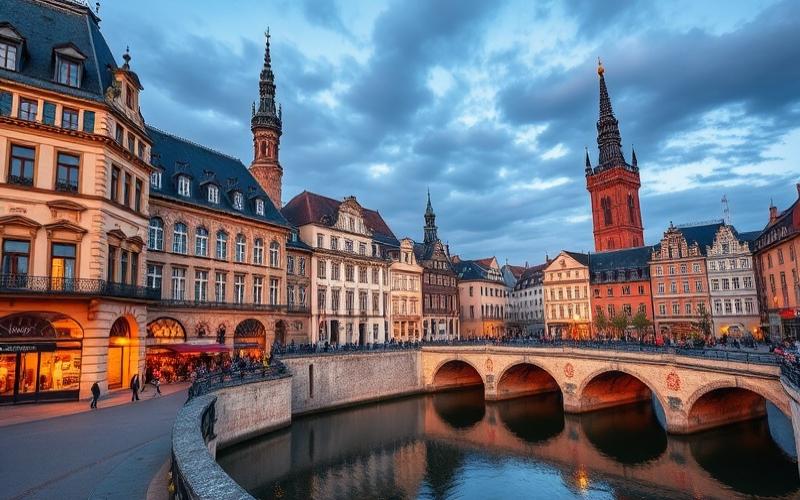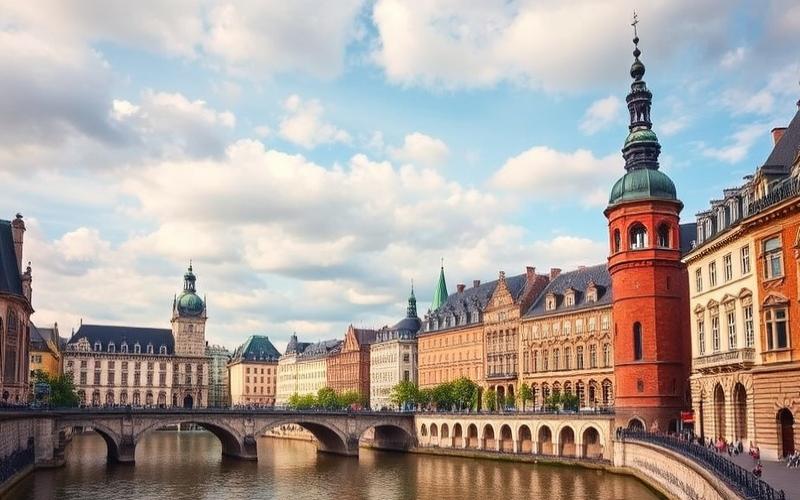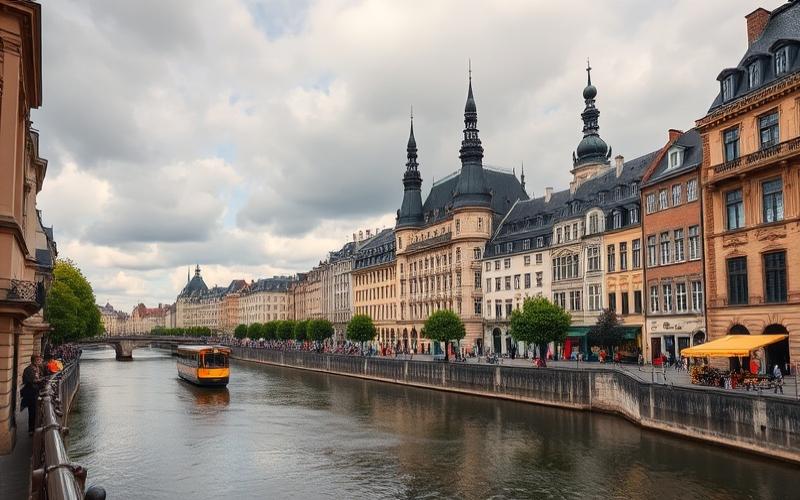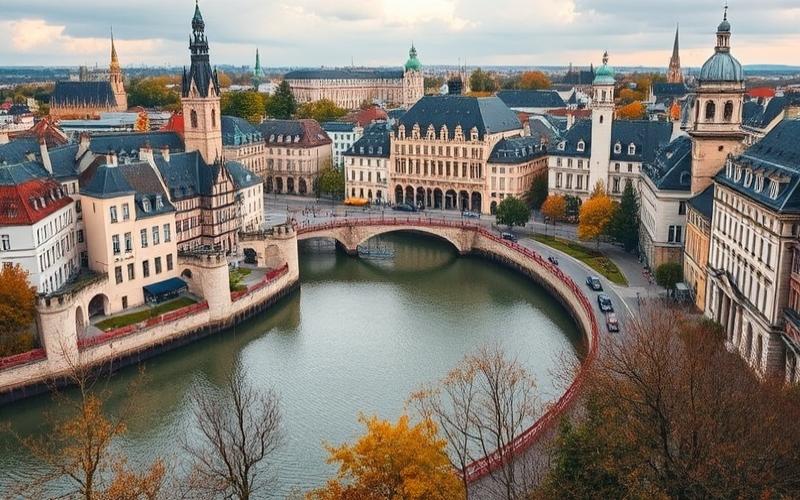
 Published on and written by Cyril Jarnias
Published on and written by Cyril Jarnias
Understanding corporate culture in Luxembourg is essential for anyone looking to integrate and succeed in the Grand Duchy’s professional world. This small country at the heart of Europe is renowned for its dynamic and multicultural business environment, where tradition and modernity harmoniously coexist. Let’s dive into the specifics of Luxembourg’s corporate culture to give you all the keys to your success.
The DNA of Luxembourg Companies: Values and Norms That Shape the Workplace
In Luxembourg, corporate culture is built on a foundation of deeply rooted values that guide professional behavior and interactions within organizations. Punctuality, professionalism, and mutual respect are considered essential pillars in the Luxembourg business world. Employees are generally expected to be on time for meetings and appointments, reflecting a culture that values time and efficiency.
Another notable aspect is the importance placed on discretion and confidentiality, particularly in the financial and banking sectors that constitute a significant part of the country’s economy. This discretion extends beyond sensitive information and is reflected in a general business approach that favors restraint and caution in communications.
Luxembourg culture also emphasizes consensus and collaboration. Important decisions are often made after consultation and discussion, rather than unilaterally. This approach fosters a work environment where employees feel heard and valued, contributing to a sense of belonging and loyalty to the company.
Good to know:
Luxembourg corporate culture values punctuality, discretion, and consensus. Adopting these values will help you integrate quickly and earn the respect of your colleagues and superiors.
Internal Communication: The Heartbeat of Luxembourg Companies
Communication within Luxembourg companies is characterized by a unique blend of formality and openness. Multilingualism is a daily reality, with French, German, and English commonly used in professional exchanges. This linguistic diversity reflects the cosmopolitan nature of the country and requires great adaptability from employees.
Formal communication channels, such as structured meetings and written reports, coexist with more informal methods like hallway conversations or coffee breaks. This duality helps maintain a balance between professionalism and friendliness, creating a work environment that is both productive and pleasant.
A notable aspect of internal communication in Luxembourg is the importance given to hierarchy. Although organizational structures tend to be flatter, respect for hierarchical lines remains important in many companies. This translates into upward communication that is often more formal, while downward communication can be more direct.
Luxembourg companies are increasingly investing in digital communication tools to facilitate exchanges, especially in the context of remote work that has developed in recent years. Collaborative platforms, corporate intranets, and instant messaging applications have become essential elements of internal communication, allowing for greater flexibility and responsiveness.
Good to know:
Mastering multiple languages and the ability to navigate between formal and informal communication are major assets in Luxembourg companies. Adapt your communication style according to the context and your interlocutor to maximize your effectiveness.
Luxembourg-Style Leadership: Between Tradition and Innovation
The management style in Luxembourg reflects a subtle balance between traditional and modern approaches. Hierarchical structure remains important in many organizations, particularly in more conservative sectors like finance and public administration. However, there is a trend toward more participatory and inclusive leadership styles, especially in startups and technology companies.
Luxembourg managers are generally perceived as leaders who value expertise and experience. They tend to adopt a pragmatic approach to management, focusing on problem-solving and achieving concrete objectives. This results-oriented approach is often accompanied by a desire to create a stable and secure work environment for employees.
A distinctive aspect of management in Luxembourg is the ability to navigate a multicultural environment. Leaders must be capable of managing diverse teams composed of people from different nationalities and cultures. This diversity requires great flexibility and intercultural sensitivity in the managerial approach.
Innovation in management practices is gaining ground, with a growing trend toward employee empowerment and the promotion of work-life balance. Initiatives such as teleworking, flexible hours, and workplace wellness programs are increasingly adopted by Luxembourg companies, reflecting an awareness of the importance of employee well-being for productivity and talent retention.
Good to know:
The management style in Luxembourg is evolving toward more flexibility and inclusivity while maintaining a hierarchical structure. Show respect for hierarchy while demonstrating initiative and autonomy to stand out positively.
Diversity and Inclusion: Luxembourg, a Model of Professional Integration
Luxembourg stands out for its exceptional cultural diversity, with nearly 48% of its population composed of foreign residents. This demographic reality is naturally reflected in the workplace, making diversity and inclusion intrinsic elements of Luxembourg corporate culture.
Luxembourg companies are increasingly aware of the benefits of a diverse workforce, recognizing that it fosters innovation, improves decision-making, and strengthens competitiveness in the international market. Many organizations have implemented specific policies and programs to promote diversity and inclusion, ranging from inclusive recruitment initiatives to cultural awareness training.
A concrete example of this commitment is the Charte de la Diversité Lëtzebuerg, launched in 2012 and signed by more than 200 companies to date. This charter encourages organizations to actively engage in promoting diversity and inclusion in the workplace. Signatories commit to implementing concrete actions to foster a respectful and equitable work environment for all.
The Luxembourg government also plays an active role in promoting diversity and inclusion in the professional world. Initiatives such as the Diversity Awards, which recognize best practices in diversity within organizations, testify to the importance given to these values at the national level.
Despite these advances, challenges persist. Gender equality in management positions remains an objective to be achieved, and the integration of cross-border workers, who represent a significant portion of the workforce, requires ongoing attention. Luxembourg companies are encouraged to adopt proactive approaches to overcome these challenges and create truly inclusive work environments.
Good to know:
Diversity is a major strength of the Luxembourg labor market. Value your cultural background and language skills, as they can be valuable assets for local employers.
Engagement and Motivation: Winning Strategies of Luxembourg Companies
Luxembourg companies increasingly recognize the importance of employee engagement as a key factor for success and competitiveness. They implement various strategies to motivate their staff and create a stimulating and fulfilling work environment.
Continuing education and professional development are at the heart of engagement strategies in Luxembourg. Many companies invest heavily in training programs for their employees, recognizing that skill development is essential not only for company performance but also for talent satisfaction and retention. For example, the financial sector, a pillar of the Luxembourg economy, regularly offers specialized training to keep employees’ skills up to date in an ever-changing regulatory environment.
Recognition and appreciation of individual contributions are also important aspects of Luxembourg corporate culture. Reward and recognition systems, whether financial or not, are commonly used to motivate employees and acknowledge their efforts. Some companies have implemented peer recognition programs, thereby encouraging a culture of mutual appreciation within teams.
Work-life balance is increasingly valued in Luxembourg companies. Initiatives such as teleworking, flexible hours, and generous parental leave have become attractive elements for many employees. For example, the transport company Flibco.com successfully introduced a four-day work week, demonstrating a strong commitment to employee well-being while maintaining high productivity.
Luxembourg companies also place increasing importance on social and environmental responsibility as a means of engaging their employees. Many organizations encourage their employees to participate in corporate volunteering initiatives or sustainable development projects, thereby creating a sense of purpose and belonging that goes beyond business objectives.
Finally, transparent communication and employee participation in decision-making are increasingly adopted strategies to foster engagement. Companies regularly organize team meetings, opinion surveys, and feedback sessions to ensure that employee voices are heard and considered in important decisions.
Good to know:
Luxembourg companies invest in professional development, work-life balance, and social responsibility to engage their employees. Show your interest in these aspects during your interviews or discussions with your employer to demonstrate your alignment with the local culture.
Conclusion: Embracing Luxembourg Corporate Culture for Success
Corporate culture in Luxembourg is a unique blend of traditions and innovations, reflecting the country’s position as a European business crossroads. By understanding and adopting key values such as professionalism, respect for diversity, and commitment to excellence, you will be well positioned to succeed in this dynamic environment.
Remember that flexibility and open-mindedness are essential for navigating the multicultural landscape of Luxembourg companies. Whether you are an experienced professional or at the beginning of your career, embracing this unique culture will open up many opportunities in this growing economic hub.
Disclaimer: The information provided on this website is for informational purposes only and does not constitute financial, legal, or professional advice. We encourage you to consult qualified experts before making any investment, real estate, or expatriation decisions. Although we strive to maintain up-to-date and accurate information, we do not guarantee the completeness, accuracy, or timeliness of the proposed content. As investment and expatriation involve risks, we disclaim any liability for potential losses or damages arising from the use of this site. Your use of this site confirms your acceptance of these terms and your understanding of the associated risks.

















